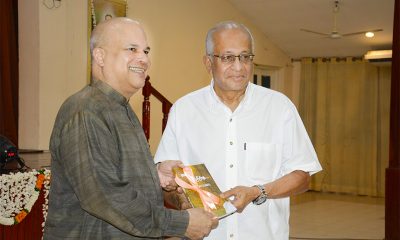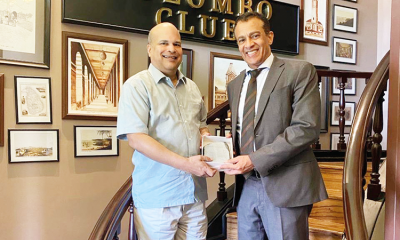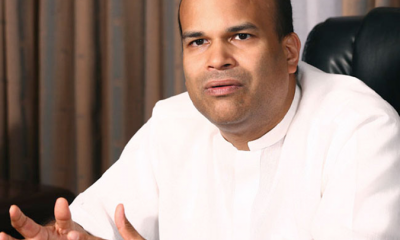News
Security threat to India is threat to Lanka: Envoy Moragoda

Any security threat to India is also a security threat to Sri Lanka, Lankan High Commissioner Milinda Moragoda told Times Of India as he sought to reassure the Indian government that in line with their bilateral agreement and understanding, the island nation won’t allow its ports to be used by a foreign country in any manner that is prejudicial to India’s interests.
Describing India as the key to “sustainable” economic recovery of debtridden Sri Lanka, the High Commissioner said that the strategically located country is exploring with India trilateral cooperation opportunities with Japan, Israel and UAE.
According to Moragoda, Sri Lanka wants economic integration with India which, he said, will allow the country to expand its existing economic model and ensure quicker recovery from the debt crisis it’s facing. Asked about the recent controversy over the docking of a Chinese “spy vessel” at the Hambantota port, Moragoda said Sri Lanka is in talks with India to finalise a mechanism that would allow the two countries to address such issues.
“If we can hitch on to India, when you move we can move too. Geopolitical issues, in my view, will get resolved on their own once this economic integration with India takes place. Of course, till then we need to have dialogue, develop understanding and ensure we don’t cross the red lines,” said Moragoda.
“Our security concerns are totally in line. The basic principle is that we believe what is a security threat to India is also a security threat to us and we assume India also thinks the same,” he added.
While the supply of essential commodities in Sri Lanka has improved, the country is grappling with food inflation which has reached 80 per cent. Sri Lanka is currently having debt-restructuring talks with India, which has provided assistance worth $ 3.8 billion to the country this year, China and the Paris Club creditors. The talks, which are important for Lanka to access an IMF bailout package, are reported to have been impeded by India-China rivalry for influence in Sri Lanka. “The package may not be huge but a certificate of good economic engagement from the IMF is important. It will encourage investment, and also exports. I don’t think it (India-China rivalry) has affected the talks but it’s a fact that politics in our region has entered a dangerous phase. There’s no question that geopolitics has a bearing on every aspect of what we do,” he said.
Sri Lanka believes that trilateral cooperation will help expedite its economic recovery by attracting more investments. “President Wickremesinghe discussed trilateral cooperation with India and Japan during his visit to Tokyo. Renewables, petroleum, telecom and ports are four sectors where India, Sri Lanka and Japan can work together,” said Moragoda, adding discussions are also on with Israel for trilateral cooperation in agriculture. The UAE is another country Sri Lanka is hoping to attract investments from, through trilateral cooperation, involving India.
While India has said at the UN Human Rights Council that Sri Lanka hasn’t done enough to fulfil its commitments on the Tamil issue under the 13 th Constitutional Amendment, Moragoda said there was nothing new in what the Indian government had said. “The nuance may have changed but India has been very consistent on the substance part of it. Politically, Sri Lanka is in a transition phase and there is a need to renegotiate the social and political compact in the country. Sri Lanka is a complex country with many religions and ethnicities. This issue (13 th Amendment) also falls under the same category. We have to work out a new compact,” he said.
Moragoda added Lanka is looking to intensify cooperation with India in areas like tourism, electricity, petroleum and connectivity. “Sustainable recovery is important and we would like to look at ways we can integrate with the Indian economy. Had we integrated with the Indian economy earlier, we would have grown very, very fast,” he said.
News
US sports envoys to Lanka to champion youth development

The U.S. Embassy in Colombo welcomed the U.S. Sports Envoys to Sri Lanka, former National Basketball Association (NBA) and Women’s National Basketball Association (WNBA) players Stephen Howard and Astou Ndiaye, from June 8 through 14.
The Public Diplomacy section of the U.S. Embassy said that it would launch a weeklong basketball program intended to harness the unifying power of sports, made possible through collaboration with Foundation of Goodness and IImpact Hoop Lab.
While in Sri Lanka, Howard and Ndiaye, both retired professional basketball players, will conduct a weeklong program, Hoops for Hope: Bridging Borders through Basketball. The Sports Envoys will lead basketball clinics and exhibition matches and engage in leadership sessions in Colombo and Southern Province for youth aged 14-18 from Northern, Uva, Eastern and Western Provinces, offering skills and leadership training both on and off the court. The U.S. Envoys will also share their expertise with the Sri Lanka Basketball Federation, national coaches, and players, furthering the development of basketball in the country. Beyond the clinics, they will collaborate with Sri Lankan schoolchildren to take part in a community service project in the Colombo area.
“We are so proud to welcome Stephen and Astou as our Sports Envoys to Sri Lanka, to build on the strong people-to-people connections between the United States and Sri Lanka,” said U.S. Ambassador Julie Chung. “The lessons that will be shared by our Sports Envoys – communication, teamwork, resilience, inclusion, and conflict resolution – are essential for leadership development, community building, equality, and peace. The U.S. Sports Envoy program is a testament to our belief that sports can be a powerful tool in promoting peace and unity.”
News
Rahuman questions sudden cancellation of leave of CEB employees

SJB Colombo District MP Mujibur Rahuman in parliament demanded to know from the government the reasons for CEB suspending the leave of all its employees until further notice from Thursday.
MP Rahuman said that the CEB has got an acting General Manager anew and the latter yesterday morning issued a circular suspending leave of all CEB employees with immediate effect until further notice.
“We demand that Minister Kanchana Wijesekera should explain this to the House. This circular was issued while this debate on the new Electricity Amendment Bill was pending. There are many who oppose this Bill. The Minister must tell parliament the reason for the urge to cancel the leave of CEB employees,” the MP said.However, Speaker Mahinda Yapa Abeywardena prevented Minister Wijesekera responding to the query and said that the matter raised by MP Rahuman was not relevant.
News
CIPM successfully concludes 8th Annual Symposium

The Chartered Institute of Personnel Management (CIPM) successfully concluded the 8th Annual CIPM Symposium, which took place on 31st May 2024. Themed “Nurturing the Human Element—Redefining HRM in a Rapidly Changing World,” the symposium underscored the pivotal role of human resource management (HRM) in today’s dynamic global landscape. Since its inception in 1959, CIPM has been dedicated to advancing the HR profession through education, professional development, and advocacy, solidifying its position as Sri Lanka’s leading professional body for HRM.
Ken Vijayakumar, the President of the CIPM, graced the occasion as the chief guest. The symposium commenced with the welcome address by the Chairperson, Prof. Arosha Adikaram, followed by the Web Launch of the Symposium Proceedings and Abstract Book by the CIPM President. The event featured distinguished addresses, including a speech by Chief Guest Ken Vijayakumar, President of CIPM, and an address by Guest of Honor Shakthi Ranatunga, Chief Operating Officer of MAS Holdings Pvt. Ltd., Sri Lanka.
The symposium also featured an inspiring keynote address by Prof. Mario Fernando, Professor of Management and Director of the Centre for Cross Cultural Management (CCCM) at the University of Wollongong, Australia.
Vote of Thanks of the inauguration session was delivered by Dr. Dillanjani Weeratunga, Symposium Co-chair.
The symposium served as a comprehensive platform for researchers to present their findings across a wide range of critical topics in HRM. These included Cultural Diversity and Inclusion, Talent Development and Retention, Ethical Leadership and Corporate Social Responsibility, Adapting to Technological Advancements, Mental Health and Well-being at Work, Global Workforce Challenges, Employee Empowerment, and Reskilling and Upskilling.
The plenary session was led by Prof. Wasantha Rajapakse. Certificates were awarded to the best paper presenters during the valedictory session, followed by a vote of thanks delivered by Kamani Perera, Manager of Research and Development.
The annual symposium of CIPM was a truly inclusive event, attracting a diverse audience that spanned undergraduates, graduates, working professionals, research scholars and lecturers. This widespread interest highlights the symposium’s significance in the field of HRM, offering a unique opportunity for everyone to network and learn from scholarly brains.The CIPM International Research Symposium was sponsored by Hambantota International Port, Sri Lanka Institute of Information Technology (SLIIT), E B Creasy & Co. PLC, and Print Xcel Company.






















